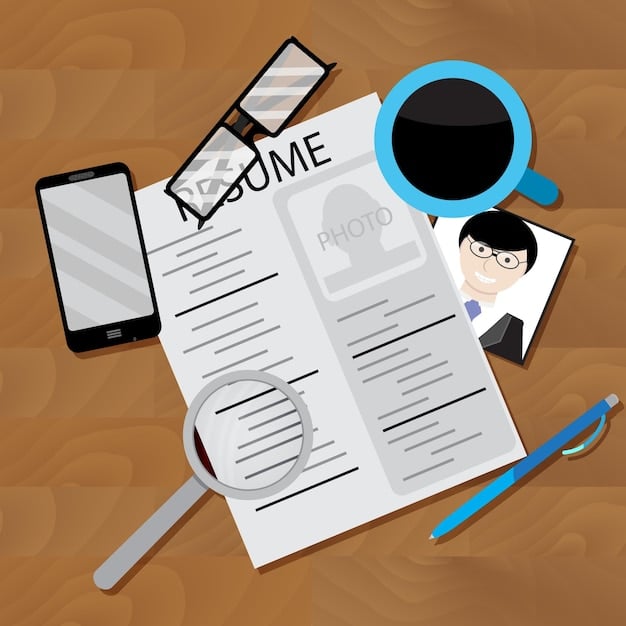Ace Your Biotech Interview in the US: Insider Knowledge & Expert Tips

Insider knowledge is crucial for acing a biotech interview in the US, requiring preparation, understanding of industry-specific questions, and showcasing relevant skills and experiences.
Landing a job in the competitive biotech industry in the US requires more than just a strong resume. The interview is where you truly shine. Insider knowledge: how to ace a biotech interview in the US: expert tips and strategies will offer you how to navigate this crucial step with confidence.
Understanding the US Biotech Landscape
The US biotech sector is a powerhouse of innovation, but it also presents a unique set of challenges for job seekers. Knowing the industry’s current trends and key players is essential for demonstrating your interest and understanding during an interview.

Current Trends in the Biotech Industry
Staying informed about the latest advancements and challenges in the biotech field is essential. This knowledge will enable you to articulate your understanding of the industry’s direction, as well as your capacity to make proactive contributions.
- Personalized Medicine: The rise of treatments tailored to an individual’s genetic makeup.
- CRISPR Technology: Revolutionary gene-editing technologies and their potential applications.
- Biomanufacturing: Innovations in manufacturing processes to produce biologics more efficiently.
In summary, getting familiar with the US biotech landscape involves staying informed about the current trends, understanding regional differences, and being prepared to discuss the industry’s challenges. This combined knowledge will significantly enhance your interview performance.
Preparing Your Biotech Resume and Cover Letter
Before the interview, your resume and cover letter serve as your introduction. Tailoring these documents to reflect the specific requirements of the biotech role is crucial. Highlighting relevant technical skills and accomplishments will set you apart from other candidates.
Showcasing Relevant Skills
Your resume should clearly demonstrate your technical skills and experience. Use specific examples and quantify your achievements whenever possible.
- Data Analysis: Proficiency in statistical software and bioinformatics tools.
- Laboratory Techniques: Expertise in cell culture, PCR, and other relevant methodologies.
- Regulatory Knowledge: Familiarity with FDA regulations and compliance procedures.
Tailoring Your Cover Letter to the Specific Role
A generic cover letter is a missed opportunity. Instead, tailor your cover letter to address the specific requirements of the job description. Highlight how your skills and experience align with the company’s goals and values.
In essence, crafting an effective biotech resume and cover letter requires attention to detail, clear communication of your skills and experiences, and a tailored approach that aligns with the specific requirements of the job. Doing so will significantly increase your chances of landing an interview.

Mastering Common Biotech Interview Questions
Biotech interviews often include a mix of technical and behavioral questions. Preparing structured answers using the STAR method (Situation, Task, Action, Result) can help you articulate your experiences effectively. Expect to be asked about your research experience, problem-solving abilities, and teamwork skills.
Technical Questions
Expect to answer questions about your technical background and experience. These questions assess your understanding of scientific principles and your ability to apply them to real-world problems.
- “Describe your experience with cell culture techniques.”
- “Explain your understanding of PCR and its applications.”
- “How do you approach data analysis in your research?”
Behavioral Questions
Behavioral questions are designed to assess your soft skills and how you have handled past situations. Use the STAR method to provide structured and compelling answers.
- “Tell me about a time you faced a challenging problem in the lab. How did you solve it?”
- “Describe a situation where you had to work as part of a team to achieve a goal.”
- “How do you handle conflicting priorities when working on multiple projects?”
Being prepared to answer both technical and behavioral questions in a biotech interview is crucial for showcasing your expertise. Use the STAR method to structure your answers, demonstrate your problem-solving abilities, and illustrate your collaborative spirit. This preparedness will significantly enhance your interview performance.
Showcasing Your Research Experience
In the biotech industry, practical research experience is highly valued. During the interview, be prepared to discuss your research projects in detail, highlighting your contributions, methodologies, and outcomes. Demonstrate your understanding of the scientific process and your ability to critically analyze data.
- Project Overview: “I worked on a project aimed at developing a novel drug delivery system.”
- Methodology: “We used nanotechnology to encapsulate drugs, enhancing their bioavailability and targeted delivery.”
- Outcomes: “The results showed a significant increase in drug efficacy and reduced side effects in preclinical trials.”
Highlighting Your Contributions
Clearly outline your role and responsibilities in each project. Be specific about the techniques you used, the data you analyzed, and the conclusions you drew.
Showcasing your research experience effectively is crucial for demonstrating your expertise. By preparing to discuss your projects in detail, highlighting your contributions, and demonstrating critical thinking skills, you can leave a lasting impression on the interviewers.
Understanding Company Culture and Values
Before the interview, research the company’s mission, values, and culture. Aligning your personal values with those of the company can demonstrate your long-term commitment and compatibility. Be prepared to discuss how you can contribute to the company’s goals and create a positive work environment.
Researching the Company
Before the interview, conduct thorough research on the company. Understand its mission, values, and recent achievements.
Understanding the company’s culture and values is incredibly important because it shows them that you want to be a part of their company. In doing so, it shows commitment and compatibility.
Asking Insightful Questions
Asking thoughtful questions at the end of the interview demonstrates your interest in the company. Prepare a list of questions that show your curiosity and engagement. Avoid asking questions that can be easily answered through online research. Instead, focus on understanding the team dynamics, future projects, and growth opportunities.
- “What are the biggest challenges the company is currently facing?”
- “How would you describe the day-to-day responsibilities of this role?”
- “What opportunities are there for professional development within the company?”
Demonstrating Your Engagement
Your questions should reflect your genuine interest in the company and the role. Engage in a thoughtful conversation with the interviewer.
Asking thoughtful questions at the end of the interview showcases your interest in the company and the role. Prepare a list of insightful questions, demonstrate your engagement, and make a lasting positive impression.
| Key Point | Brief Description |
|---|---|
| 💡 Industry Trends | Stay updated on personalized medicine and CRISPR tech. |
| 🧪 Relevant Skills | Highlight lab techniques, data analysis, and regulation knowledge. |
| ❓ Interview Prep | Use STAR method for behavioral questions. |
| 🏢 Company Fit | Research the company culture and values beforehand. |
Frequently Asked Questions
▼
Common skills sought include technical proficiency in lab techniques, data analysis, regulatory knowledge, and strong problem-solving abilities. Communication and teamwork skills are also highly valued.
▼
It’s crucial to tailor your resume to match the specific requirements of the biotech role. Highlight relevant skills, experiences, and accomplishments that align with the job description.
▼
The STAR method (Situation, Task, Action, Result) is a structured approach to answering behavioral questions. It helps you provide clear and compelling examples of your past experiences and skills.
▼
Researching the company helps you understand its mission, values, and culture. This knowledge enables you to demonstrate your alignment with the company and ask thoughtful questions during the interview.
▼
Ask questions that demonstrate your interest in the company and role. Focus on understanding team dynamics, future projects, and growth opportunities, rather than easily researchable information.
Conclusion
Acing a biotech interview in the US requires a combination of technical expertise, soft skills, and thorough preparation. By understanding the industry landscape, mastering common interview questions, showcasing your research experience, and aligning with company values, you can significantly increase your chances of landing your dream job in the biotech sector.





